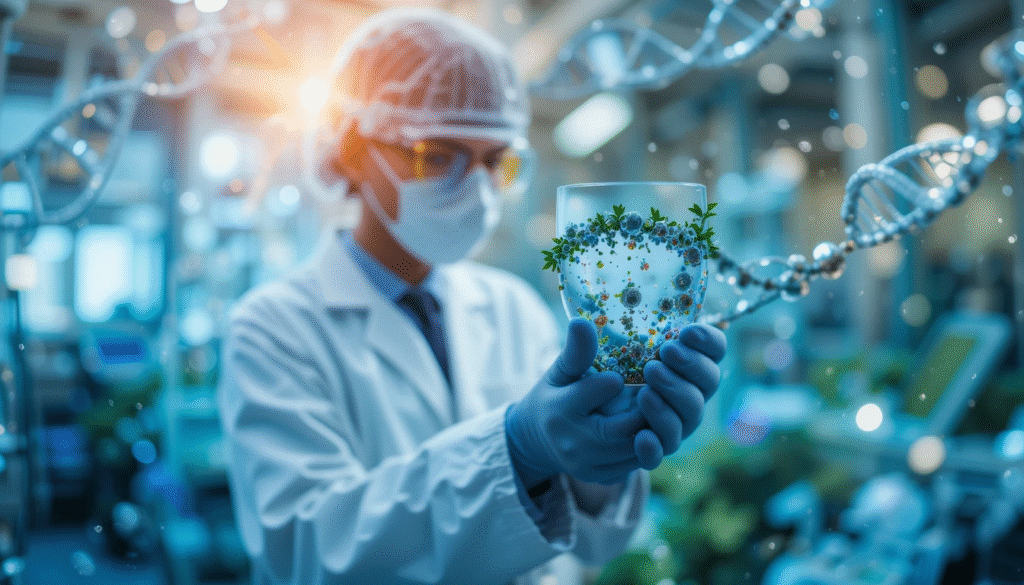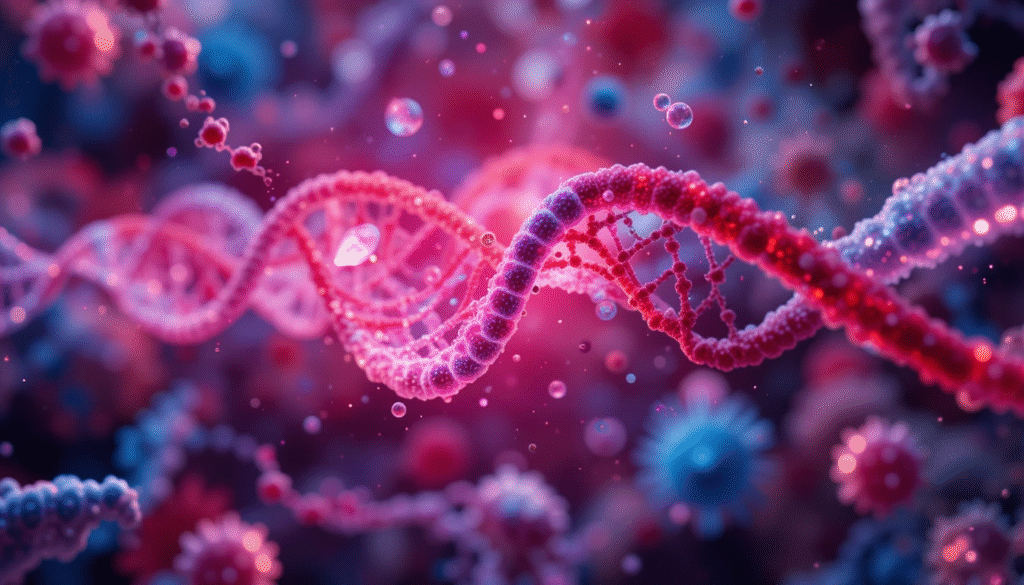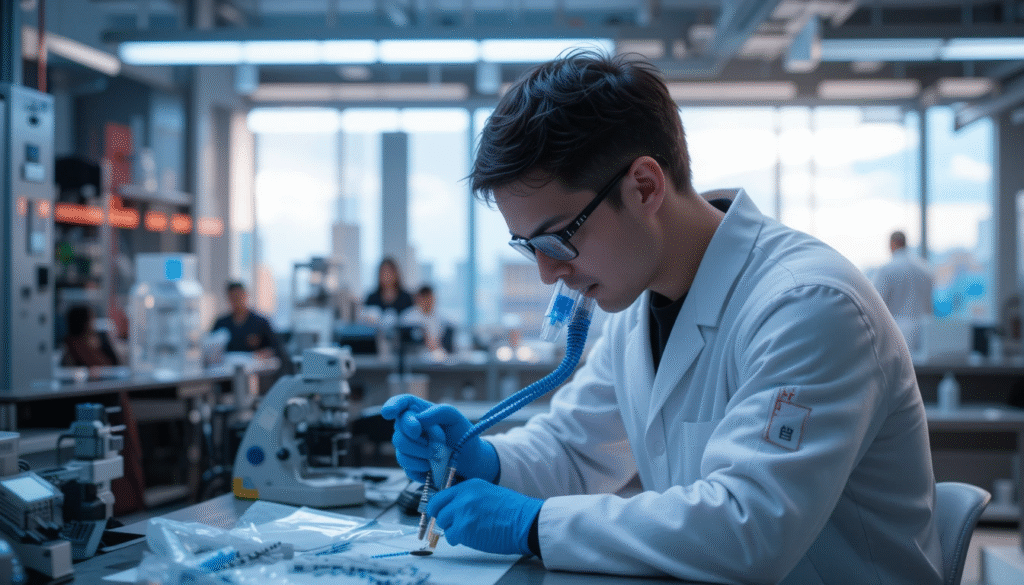Modern sciences groundbreaking disciplines of genetic engineering and biotechnology have revolutionized industry, agriculture, medicine and environmental sustainability. While biotechnology is the wide use of biological systems, organisms, or derivatives to produce valuable goods and uses, genetic engineering is the direct manipulation of an organisms DNA to change its properties. Together, they constitute a potent scientific field that will influence future developments in ecological balance, food security, and human health. These technologies’ quick growth has given rise to optimism that they will help address some of the most pressing issues facing the globe, including hunger, illness and climate change.

The Genetic Engineering Concept
Through the use of genetic engineering tools, scientists may add, remove, or alter certain genes inside the genome of an organism. Tools like CRISPR-Cas9, gene cloning, and recombinant DNA technologies enable this exact modification. Genetic engineering offers precise control over an organism’s genetic composition, in contrast to conventional selective breeding, which depends on natural variation. For instance, scientists can introduce human insulin-producing genes into bacteria for therapeutic purposes or a bacterial gene to plants to make them pest-resistant. Genetic engineering is one of the most potent instruments in contemporary biotechnology because of its accuracy and control.
Biotechnology: An Expanded Field
While biotechnology is the general word that includes a variety of methods, genetic engineering is a subset. It makes use of biological systems to create useful goods including genetically modified crops, vaccines, enzymes, antibiotics, and biofuels. Biotechnology falls into a number of categories:
The creation of medications, vaccines, gene treatments, and diagnostic instruments is known as medical biotechnology.
Agricultural biotechnology producing genetically modified (GM) crops that are more nutritious, resistant to pests, and have larger yields.
Industrial biotechnology is the process of producing chemicals, biofuels, and biodegradable polymers utilizing microorganisms and enzymes.
Utilizing microorganisms for pollution management, waste treatment, and oil spill cleaning is known as environmental biotechnology.
Medical Applications

The medical field is among the areas where genetic engineering and biotechnology have had the biggest effects. By modifying bacteria and yeast, researchers may create recombinant proteins such as insulin, human growth hormone, and clotting factors. By directly replacing or repairing damaged genes, gene therapy is a cutting edge method that may be able to cure genetic illnesses. The creation of vaccines has also been transformed by biotechnology, as demonstrated by the COVID-19 mRNA vaccines, which were produced and disseminated at a never before seen pace. Additionally, genetically modified immune cells, or CAR-T cells, are helping to cure tumors that were previously incurable.
Developments in Agriculture
Biotechnology and genetic engineering have revolutionized agriculture. In order to increase output and decrease the use of pesticides, farmers are increasingly using genetically engineered crops that are resistant to diseases, pests, and herbicides. Examples include Golden Rice, which is vitamin A fortified to prevent malnutrition, and Bt cotton, which is designed to generate a natural pesticide. Additionally, biotechnology helps to increase the nutritional content, shelf life, and storage of food. By 2050, there will likely be 10 billion people on the planet, making genetically modified crops essential to maintaining food security.
Environmental and Industrial Biotechnology
Beyond medicine and agriculture, biotechnology has far reaching industrial and environmental uses. Microorganisms engineered through genetic manipulation are used to produce biofuels, reducing dependence on fossil fuels. Enzymes derived from biotechnology are applied in detergents, textiles, and food processing industries. Environmental biotechnology uses genetically modified microbes for bioremediation, helping clean up oil spills, treat wastewater, and degrade harmful pollutants. These applications not only protect ecosystems but also promote sustainable development by reducing chemical waste and energy consumption.
Social and Ethical Issues
Notwithstanding the advantages, biotechnology and genetic engineering bring up a number of moral, societal, and environmental concerns. The safety of genetically modified crops, the potential for unforeseen ecological effects, and the moral controversy surrounding the modification of human DNA are among the issues raised. Many worry that “designer babies,” in which parents select characteristics like IQ, height, or physical attractiveness, might result from genetic engineering. Biopiracy, the exploitation of genetic resources from poor nations without just recompense, is another problem. Strong laws, open lines of communication, and moral frameworks that strike a balance between creativity and accountability are all necessary to address these issues.
Genetic Engineering and Biotechnology Future
These areas face both possibilities and problems in the future. Developments in CRISPR technology and synthetic biology provide promise for improvements in environmental protection, agriculture, and medicine. Researchers are developing genetically modified creatures to generate renewable energy, provide customized medications, and even use genome editing to revive extinct species. Governments and organizations throughout the world are concentrating on creating regulations to guarantee the ethical and safe application of biotechnology at the same time. Global hunger, climate change, and healthcare access are just a few of the problems that genetic engineering may help solve with proper regulation and public confidence.
Conclusion
In summary, biotechnology and genetic engineering are reshaping the modern world in ways that were unthinkable just a few decades ago. The solutions to the world’s problems lie in these domains, which include medical advancements, agricultural enhancements, and industrial sustainability. They must be carefully evaluated since their progress also has ethical and environmental concerns. It is evident from ongoing studies that biotechnology and genetic engineering will continue to lead scientific advancements, providing humanity with the means to create a more sustainable, technologically sophisticated, and health conscious future.



